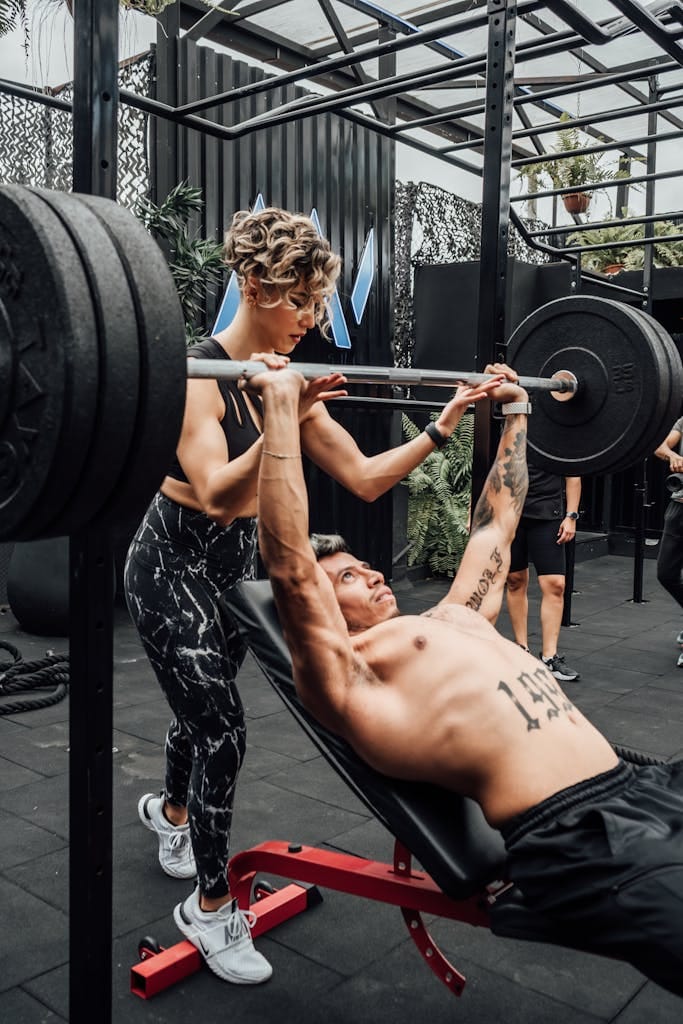FREE SHIPPING OVER $50
Can YOU Bench 225 Lbs? The True Benchmark of Strength (Are You Strong Enough?)

Walk into almost any gym, and you’ll quickly notice it: the bench press. It’s arguably the most iconic strength exercise, a true test of upper body power, and a lift that often defines someone’s “gym status.” Among the many weights one can lift, 225 pounds holds a special place. It’s not just a number; it’s a benchmark, a statement, a rite of passage for many serious lifters.
But how common is it to be able to bench 225 lbs? Can you do it? And if not, are you “strong enough” by the standards of the fitness world? This article will dive into what it truly means to bench press 225 lbs, look at the reality of who can achieve this feat, and give you actionable insights to build your own strength and maybe, just maybe, join the elusive “225 Club.”
The 225 Lb Bench Press: A True Benchmark?
So, why 225 lbs? It’s two 45-pound plates on each side of a standard 45-pound barbell. It’s neat, it’s symmetrical, and it’s a universally recognized symbol of significant strength. For many, hitting 225 lbs is more than just lifting a certain weight; it’s a personal challenge, a testament to consistent effort, proper training, and solid nutrition.
Achieving a 225 lb bench press signifies:
- Upper Body Prowess: It means you possess a high level of strength in your chest, shoulders, and triceps.
- Dedicated Training: This isn’t a weight most people lift accidentally. It requires consistent, progressive training over time.
- Mental Toughness: Pushing heavy weight takes not just physical power but also mental grit and determination.
It’s a lift that demands respect in the gym, and for many, it becomes a long-term fitness goal.
So, How Many People Can Bench 225 Lbs? The Reality Check.
If we’re talking about the general population (everyone from sedentary individuals to casual exercisers), the percentage is incredibly low – likely well under 1%. Most people never even step foot in a gym, let alone engage in the kind of dedicated strength training required to bench such a weight.
Even within the gym-going population, 225 lbs is a solid achievement. It typically places an individual in the “intermediate” to “advanced” category, depending on their bodyweight and training experience. For women, benching 225 lbs is considered an elite-level feat, often requiring years of dedicated powerlifting or strength training.
To give you a better idea of where 225 lbs stands, let’s look at some approximate strength standards based on bodyweight for dedicated lifters. These tables are based on general strength standards often used in powerlifting and fitness communities, providing a broad overview. Keep in mind individual results vary greatly due to genetics, training history, and specific programs.
Men’s Bench Press Strength Standards (Approximate 1RM by Bodyweight)
| Bodyweight (lbs) | Beginner (No Training) | Novice (Few Months) | Intermediate (1-2 Years) | Advanced (2-5 Years) | Elite (5+ Years) |
| 150 lbs | 95 lbs | 135 lbs | 175 lbs | 225 lbs | 275 lbs+ |
| 180 lbs | 115 lbs | 165 lbs | 215 lbs | 275 lbs | 325 lbs+ |
| 200 lbs | 125 lbs | 185 lbs | 240 lbs | 300 lbs | 350 lbs+ |
| 220 lbs | 135 lbs | 200 lbs | 260 lbs | 325 lbs | 375 lbs+ |
Note: The 225 lbs mark falls into the “Advanced” category for a 150 lb male, “Intermediate” for an 180 lb male, and “Intermediate” to “Advanced” for heavier lifters. This demonstrates that while achievable, it still requires significant dedication, especially for lighter individuals.
Women’s Bench Press Strength Standards (Approximate 1RM by Bodyweight)
| Bodyweight (lbs) | Beginner (No Training) | Novice (Few Months) | Intermediate (1-2 Years) | Advanced (2-5 Years) | Elite (5+ Years) |
| 120 lbs | 50 lbs | 75 lbs | 100 lbs | 130 lbs | 160 lbs+ |
| 140 lbs | 60 lbs | 85 lbs | 115 lbs | 150 lbs | 180 lbs+ |
| 160 lbs | 65 lbs | 95 lbs | 125 lbs | 165 lbs | 200 lbs+ |
| 180 lbs | 70 lbs | 105 lbs | 140 lbs | 180 lbs | 225 lbs+ |
Note: For women, benching 225 lbs is consistently in the “Elite” category across most bodyweight ranges. This underscores that it is an exceptionally high level of strength for women, often representing professional powerlifting levels.
What Factors Influence Your Bench Press Strength?
If you’re looking at these numbers and wondering how to get there, or why you might be stuck, consider these key factors that influence bench press strength:
- Training Experience and Consistency: This is paramount. Sporadic workouts won’t build the necessary strength. Consistent, well-structured training over months and years is key.
- Body Weight and Composition: Generally, heavier individuals (especially those with more muscle mass) tend to have higher bench presses. More body weight can offer more stability and leverage.
- Genetics and Bone Structure: Everyone’s body is built differently. Leverages (arm length, torso size), muscle belly insertions, and muscle fiber composition play a role. Some people are simply more naturally inclined to bench heavier than others.
- Nutrition and Recovery: Your muscles need proper fuel to perform and rebuild. Adequate protein intake, sufficient calories, and quality recovery (especially sleep!) are non-negotiable for strength gains.
- Form and Technique: An efficient bench press technique can add significant pounds to your lift. This includes proper hand placement, bracing, leg drive, and bar path. Poor form not only limits your strength but also increases injury risk.
- Accessory Work: Building strength in supporting muscle groups like your triceps, shoulders, and even your back (for stability) will directly improve your bench press.
- Mental Fortitude: Believe it or not, the mental game is huge. Pushing heavy weights requires confidence, focus, and the ability to push through discomfort.
Are YOU Strong Enough? How to Work Towards a 225 Lb Bench Press (or Just Get Stronger!)
- Master Your Form First: Before chasing heavy weights, perfect your bench press technique. Watch videos, get a coach, or ask an experienced lifter to spot and critique your form. A solid foundation prevents injuries and maximizes your strength potential.
- Implement Progressive Overload: This is the cornerstone of strength training. To get stronger, you must consistently challenge your muscles by gradually increasing the weight, reps, sets, or decreasing rest times over time.
- Train Consistently: Aim for at least 2-3 upper body workouts per week, focusing on compound movements like the bench press.
- Vary Your Rep Ranges: Don’t just do sets of 5 reps. Incorporate heavier sets (1-5 reps) for pure strength, moderate sets (6-10 reps) for muscle growth (hypertrophy), and even lighter, higher-rep sets for muscle endurance.
- Incorporate Accessory Exercises: Don’t just bench press! Strengthen your supporting muscle groups with exercises like:
- Dumbbell Presses: For unilateral strength and stability.
- Overhead Press: To build strong shoulders.
- Triceps Extensions: To improve your lockout strength.
- Push-ups: A fantastic bodyweight exercise that builds foundational strength.
- Rows and Pull-ups: Crucial for back strength and shoulder health, which indirectly supports the bench press.
- Prioritize Nutrition: Fuel your body for performance and recovery. Ensure adequate protein intake (around 0.7-1 gram per pound of bodyweight) to support muscle growth and repair. Don’t shy away from healthy carbohydrates for energy.
- Embrace Recovery: Your muscles don’t grow in the gym; they grow when you’re resting. Get 7-9 hours of quality sleep each night. Incorporate rest days and active recovery (like light walks).
Unlock Your Potential!
So, can you bench 225 lbs? Whether you’re already there, close, or just starting your strength training journey, understanding this benchmark and what it takes to achieve it can be incredibly motivating. It’s a challenging but attainable goal for many dedicated lifters. Embrace the process, prioritize proper form and recovery, and fuel your body right. The journey to strength is a rewarding one, and every pound you add to that bar brings you closer to unlocking your full potential.
Related Articles
- Torch Your Glutes With This Physical Therapist-Approved Workout Finisher
- Master Pull-ups & Forge a Monster Back: The 10-Minute Daily Method No One Tells You!
- The Only 5 Exercises You Need, According to Top Trainers, for Peak Strength & Fitness
- Engineer Your Core: The Science-Backed Plan for Next-Level Ab Strength & Stability
- Torch Fat at Home: 6 Dumbbell Moves That SMASH Spin Class for Faster Results







